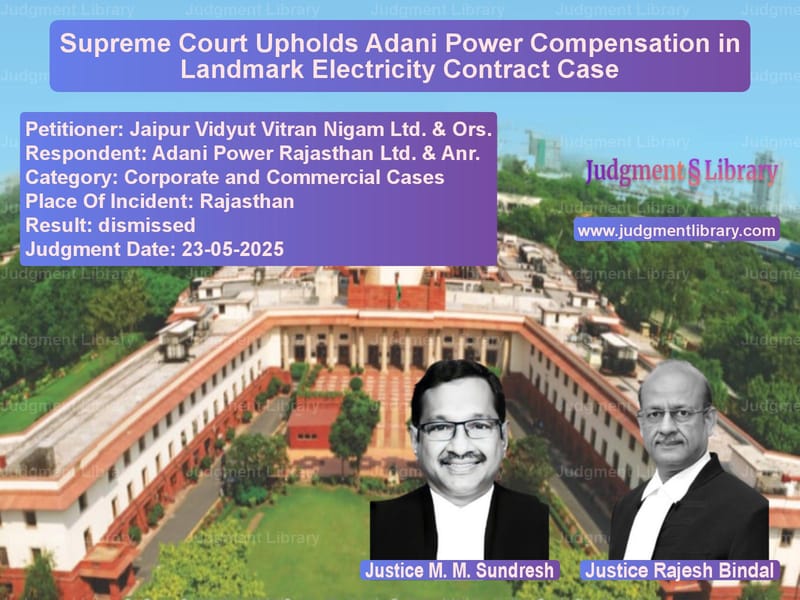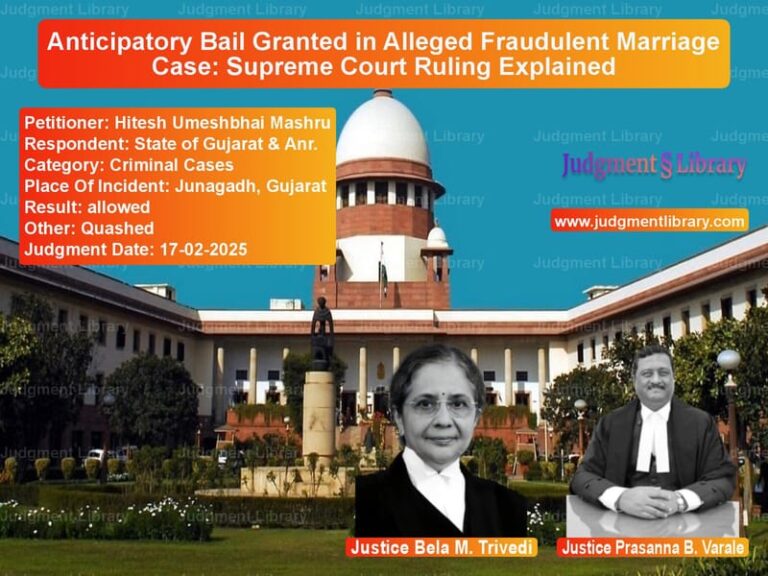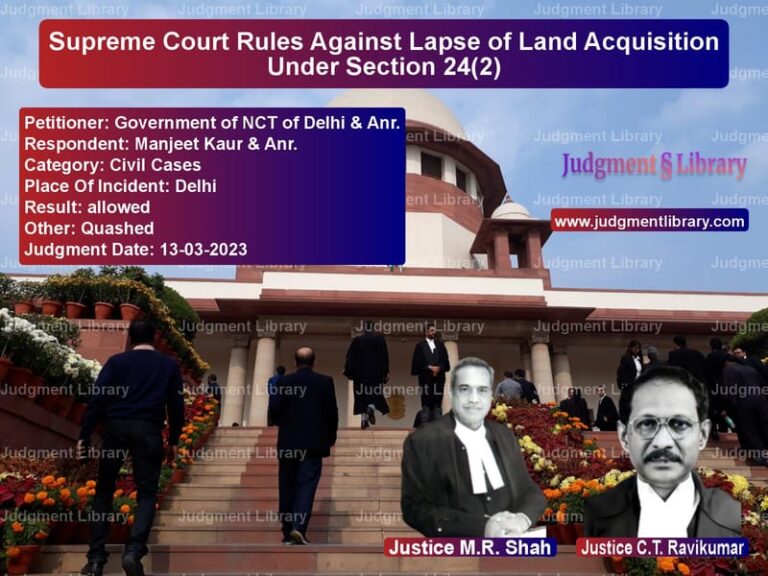Supreme Court Upholds Adani Power Compensation in Landmark Electricity Contract Case
In a significant ruling that reinforces contractual obligations in power purchase agreements, the Supreme Court of India delivered a landmark judgment on May 23, 2025, dismissing the appeal filed by Jaipur Vidyut Vitran Nigam Ltd. and other Rajasthan discoms against Adani Power Rajasthan Ltd. The case centered around whether a notification by Coal India Limited imposing Evacuation Facility Charges constituted a ‘change in law’ event under the Power Purchase Agreement, entitling the power generator to compensation.
The legal battle began when Coal India Limited issued a notification on December 19, 2017, imposing Evacuation Facility Charges of Rs. 50 per tonne on all coal dispatches except through rapid loading arrangements. Adani Power Rajasthan immediately notified the Rajasthan discoms the next day that this constituted a ‘change in law’ event under their Power Purchase Agreement dated January 28, 2010.
When the discoms failed to respond adequately, Adani Power approached the Rajasthan Electricity Regulatory Commission, which partially allowed their claims. The matter eventually reached the Appellate Tribunal for Electricity, which ruled in favor of Adani Power, holding that the notification indeed constituted a change in law event and the company was entitled to compensation from the date of the notification along with carrying costs.
The Supreme Court, in its order dated September 9, 2024, had limited the scope of the appeal to the interpretation of Article 10.2.1 vis-à-vis Article 10.5 of the Power Purchase Agreement with specific reference to Article 10.5.1(ii). However, the appellants made elaborate submissions on other issues as well during the final hearing.
Arguments of the Parties
The learned Senior Counsel Mr. Shyam Divan and learned Counsel Mr. Karthik Seth appearing for the appellants contended that “the delay has occasioned only due to the fault of respondent No.1 through the litigation process and, therefore, what is to be applied is Article 10.5.1 (ii). The APTEL was wrong in condoning the delay by allowing the applications filed by respondent No.1. There is no basis for awarding carrying cost at the rate of LPS, and the APTEL ought not to have awarded the same as the LPS is granted only when there is a delay in the payment of a supplementary bill.”
They further argued that “unless a demand is raised, there is no question of payment that would arise, as there is a clear distinction between the liability to pay, as against an obligation to pay.”
In response, Dr. Abhishek Manu Singhvi, learned Senior Counsel appearing for Adani Power, raised a preliminary objection that “arguments have been made by the appellants beyond the scope of not only the present appeal but also the order, dated 09.09.2024, of this Court. The issues sought to be raised by the appellants have already been settled by this Court in not only GMR Warora (supra) but also in two other decisions of this Court.”
He emphasized that “There is no question of raising a supplementary bill earlier, in view of the definite stand taken by the appellants on the notification made by respondent No.1 on 20.12.2017. It is nobody’s case that the appellants were going to honour the bill if raised at the earliest point of time, as contended by them.”
Court’s Analysis on Scope of Appeal
The Supreme Court began its analysis by discussing the scope of appeals under the Electricity Act, 2003. The Court emphasized that “Whenever a statute provides for an appeal, a Court is expected to restrain itself to the contours of the powers conferred under it. The nature and status of the Court loses its significance as it only draws its powers from the statute alone, and not beyond.”
The Court explained that under Section 125 of the Electricity Act, 2003, “the powers expected to be exercised by this Court is circumscribed and controlled by the pari materia provision contained under Section 100 of the Code of Civil Procedure, 1908. Thus, it is axiomatic that an appellant has to raise a substantial question of law, which if the Court finds to be in existence, shall accordingly frame it in whatever manner it deems fit and proper.”
The Court further clarified that “a mere question of law would not be sufficient enough to entertain an appeal under Section 125 of the 2003 Act. Added to that, it should be such that the substantial question of law, if answered in the affirmative in favour of the appellant, shall have the effect of reversing the decision of the APTEL.”
Interpretation of Change in Law
The Court extensively referred to its earlier decisions in GMR Warora Energy Ltd. v. CERC, Uttar Haryana Bijli Vitran Nigam Ltd. v. Adani Power Ltd., and Uttar Haryana Bijli Vitran Nigam Ltd. v. Adani Power (Mundra) Ltd., which had already settled the principles regarding change in law events.
Quoting from the GMR Warora judgment, the Court noted that “the term ‘Law’ would mean all laws including Electricity laws in force in India and any statute, ordinance, regulation, notification or code, rule, or any interpretation of any of them by an Indian governmental instrumentality and having force of law.”
The Court emphasized that “all such additional charges which are payable on account of orders, directions, notifications, regulations, etc. issued by the instrumentalities of the State, after the cut-off date, will have to be considered to be ‘change in law’ events. The generators would be entitled to compensation on the restitutionary principle on such changes occurring after the cut-off date.”
Regarding the specific notification in question, the Court observed that “CIL is an instrumentality of the State. It is thus clear that, on the cut-off date, there was no requirement of EFC, which has been brought into effect only on 19-12-2017. As such, the circular of CIL dated 19-12-2017 would also amount to ‘change in law’.”
Analysis of PPA Provisions
The Court conducted a detailed analysis of the Power Purchase Agreement provisions, particularly Articles 10.2 and 10.5. The Court explained that “Article 10.2.1 in the instant PPA was incorporated based on the principle of restitution. The idea of this principle is to compensate the affected party in order to restore it to the same economic position, but for the change in law.”
Addressing the specific controversy around Article 10.5.1(i) versus 10.5.1(ii), the Court held that “Article 10.5.1 (ii) of the PPA is not applicable to the facts of the instant case since there is no change in law which has occasioned by way of an interpretation given by a Court or a Tribunal or an Indian Governmental Instrumentality. Recognising a change in law is different from interpreting a notification as the one applicable to the parties.”
The Court further clarified that “The Notification, dated 19.12.2017, and its application are not in dispute. What is in dispute is whether it constitutes a change in law or not. So long as there is no interpretation on the Notification with respect to its applicability to the parties before us, Clause (ii) of Article 10.5.1 of the PPA will have no application.”
Carrying Cost and Late Payment Surcharge
The Court upheld the Appellate Tribunal’s decision granting carrying cost at Late Payment Surcharge rates, relying on its earlier judgments. Quoting from the UHBVNL v. Adani Power (Mundra) Ltd. case, the Court emphasized that “Once carrying cost has been granted in favour of Respondent 1 Adani Power, it cannot be urged by the appellants that interest on carrying cost should be calculated on simple interest basis instead of compound interest basis. Grant of compound interest on carrying cost and that too from the date of the occurrence of the change in law event is based on sound logic.”
The Court further noted that “The idea behind granting interest on carrying cost is not far to see, it is aimed at restituting a party that is adversely affected by a change in law event and restore it to its original economic position as if such a change in law event had not taken place.”
The Court rejected the appellants’ argument that there was no provision in the PPA for payment of compound interest, stating that “The entire concept of restitutionary principles engrained in Article 13 of the PPAs has to be read in the correct perspective. The said principle that governs compensating a party for the time value for money, is the very same principle that would be invoked and applied for grant of interest on carrying cost on account of a change in law event.”
Supplementary Bill Requirement
The Court addressed the appellants’ contention that Adani Power should have raised a supplementary bill earlier. The Court held that “a supplementary bill has to be raised only after due adjudication by the competent forum.” The Court explained that “Under Article 8.8, the other party is duty-bound to make the payment when a supplementary bill is raised due to a change in law event having occurred, as provided under Article 10 of the PPA. This can happen only after due adjudication by the competent forum, has taken place.”
The Court pointed out that “respondent No.1 did notify the change in law event immediately on the very next day of the notification having been issued” and that “the contention that the supplementary bill ought to have been raised earlier and, therefore, the payment can only be made thereafter has neither a factual basis nor a legal one.”
Final Ruling
In its concluding remarks, the Court expressed concern about unnecessary litigation, noting that “when the PPA itself provides a mechanism for payment of compensation on the ground of ‘change in law’, unwarranted litigation, which wastes the time of the Court as well as adds to the ultimate cost of electricity consumed by the end-consumer, ought to be avoided. Ultimately, the huge cost of litigation on the part of DISCOMS as well as the generators adds to the cost of electricity that is supplied to the end-consumers.”
The Court dismissed the appeal, holding that “For the aforesaid reasons, we find absolutely no reason to interfere with the impugned judgment. Liability has been fastened upon the appellants under the agreement.”
This judgment reinforces the importance of adhering to contractual obligations in power purchase agreements and provides clarity on the treatment of change in law events, particularly those arising from notifications by government instrumentalities. The ruling emphasizes the restitutionary principle in such contracts and sets important precedents for future disputes in the power sector.
Petitioner Name: Jaipur Vidyut Vitran Nigam Ltd. & Ors..Respondent Name: Adani Power Rajasthan Ltd. & Anr..Judgment By: Justice M. M. Sundresh, Justice Rajesh Bindal.Place Of Incident: Rajasthan.Judgment Date: 23-05-2025.Result: dismissed.
Don’t miss out on the full details! Download the complete judgment in PDF format below and gain valuable insights instantly!
Download Judgment: jaipur-vidyut-vitran-vs-adani-power-rajastha-supreme-court-of-india-judgment-dated-23-05-2025.pdf
Directly Download Judgment: Directly download this Judgment
See all petitions in Contract Disputes
See all petitions in Corporate Compliance
See all petitions in Company Law
See all petitions in Judgment by M.M. Sundresh
See all petitions in Judgment by Rajesh Bindal
See all petitions in dismissed
See all petitions in supreme court of India judgments May 2025
See all petitions in 2025 judgments
See all posts in Corporate and Commercial Cases Category
See all allowed petitions in Corporate and Commercial Cases Category
See all Dismissed petitions in Corporate and Commercial Cases Category
See all partially allowed petitions in Corporate and Commercial Cases Category







